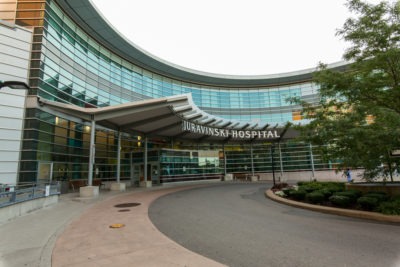For information about visiting during the COVID-19 pandemic, please visit our Appointments & Visiting page.
The Musculoskeletal Oncology Rehabilitation Unit (M2) cares mainly for patients who have undergone surgery for a fractured hip or total joint replacement or for patients with a neuro-oncology diagnosis.
Care We Provide
We provide rehabilitation care for patients who had surgery for a fractured hip or joint replacement or have experienced a neuro-oncology diagnosis. Patients may be waiting for supportive care in another environment or may require more care before returning home. Based on their current medical situation and the care they will likely need in the future, rehabilitation may be an option to support this goal.
The overall goal of the program is to maximize abilities and help achieve a successful discharge back to a community setting at an appropriate level of care.
The objectives include:
- Providing rehabilitative care to decrease excess disability and to assist the person to optimize or maintain his/her functional level.
- Improving quality of life by helping the person achieve his/her personal goals and activities of daily living.
- Involving family members of patients as partners in care, and supporting and educating families throughout the course of the illness.
- Working collaboratively with community partners to achieve a successful discharge.
Patient Information
During your stay, a team of health care providers will guide your care, but you are the most important member of the team. There is a lot to learn and do during your stay here. Your days will be busy with therapy and learning new skills. Depending on your goals and needs, your stay in the program will be about 2 weeks.
About your care
- Team meetings – As part of your care, the team meets regularly. Discussion on your progress will occur, including when you will be able to go home. Please let a member of your team know if you have any concerns to share with them.
- Skin care – Lying in bed puts pressure on your skin. This pressure can lead to wounds or sores. The best way to prevent skin problems is to change positions often and avoid lying down in bed for long periods. Members of your care team will encourage you to get up and move as much as possible. Eating and drinking well also support healthy skin.
- Personal care – You will do as much of your daily personal care as possible. We do not have bathtubs and you should expect 2 – 3 showers per week.
- Clothing and shoes – Wear loose fitting comfortable clothing. Clothes will need washing at home. You must always wear non-slip footwear. Check with your therapist before buying new shoes.
- Personal items – You are responsible for all personal items. Please label your items. Leave large amounts of money, credit cards, Jewelry and other valuables at home.
- Smoking – We are smoke-free hospital. Smoking is not permitted anywhere on the grounds, including parking lots, garages, and vehicles. For support, talk to a member of your care team.
- Passes from the hospital – If you condition is stable, you may receive a trial discharge home. It may be a few hours, a day, overnight or even a weekend. Not all patients receive this type of pass before leaving our program.
- Discharge day – Discharge time is 8:00 am. Before you leave, remember to pick up your appointment list and medication prescriptions from your nurse.
- Home and community care (LHIN) – If you and your care team agree that home care is necessary, a referral to the Local Health Integration Network (LHIN) will occur. A care coordinator will discuss your needs with you.
Family Life
We encourage family and close friends be a part of the team. If they are sick, please encourage them not to visit until they are well, as this can put you and other patients at risk of becoming ill.
They can help by:
- Providing emotional support and understanding as you adjust to changes to your lifestyle.
- They can go with you to some therapies and learn how to help you. When they visit you, and you are hard at work doing your therapy, please let them know that this is what you need to do!
- Family and friends can also help when you are ready to spend some time out of the hospital practicing your new skills.
- They can attend meetings concerning your progress and help you return to the community.
Team Members
Chaplain – Available to offer spiritual and emotional support for issues related to you being in hospital.
Clinical Educator – Support Staff in addressing their learning needs. Supports team in providing the best quality of care.
Clinical Nurse Specialist (CNS) – Brings research evidence to the unit to assist the team to provide the best level of care.
Clinical Manager – Manages the resources and the day-to-day issues on the unit. Develops the team, so that the best care possible is provided.
Community Care, LHIN Coordinator – Assesses your eligibility for home care. Helps with your discharge planning if home care is required.
Dietitian, Registered (RD) – Assesses, recommends and explains the need for all special diets.
Dietetic Assistant (DA) – Works with the dietitian to identify nutrition issues. Checks the success of nutrition care.
Environmental Associate (EA) – Keeps our environment clean. Helps with your meal trays and drinking water. Looks after daily supplies for the bathrooms and bedrooms.
Nurse Practitioner – Assesses patients referred to the rehabilitation program. Works with the team to coordinate your care with various specialists. Prescribes and reviews medications, tests and procedures.
Occupational Therapist (OT) – Assesses and recommends ways for you to safely do daily tasks such as dressing, going to the bathroom, eating, doing household chores, and skills needed for work. Assesses your thinking skills and memory. Plans a program to increase your independence and safety in daily activities. Makes recommendations for changes in the home, and for self-care equipment and aids as needed to improve your safety. Works with caregivers and families to ensure your safety and independence.
Pharmacist – Makes recommendations about medications, and helps ensure their safe use. Provides education and information on medications.
Pharmacy Technician – Works with the pharmacist to make sure medications are dispensed safely.
Physician (doctor) – Manages your medical care. Examines you when you first come in and checks your progress throughout your stay. Prescribes and reviews medications, tests and procedures. A physiatrist is a doctor who is a specialist in rehabilitation. A hospitalist is a doctor who works on our units to look after your day-to-day medical issues.
Physiotherapist (PT) – Assesses your physical abilities. Helps to improve your strength, coordination, flexibility, balance and fitness. Develops a program to improve your physical function during such activities as walking, climbing stairs, moving in and out of bed or a chair. Provides exercises that you may do with your therapists or for you to do on your own. Works with caregivers and families to ensure your safety and independence.
Occupational/Physiotherapist Assistant (OTA/PTA) – After OT and PT assess your needs, they may assign part of your therapy to an OTA/PTA, who works closely with you and your family to achieve your treatment goals. Provides you with adaptive aids and equipment needs or modifications as needed.
Registered Nurse (RN) and Registered Practical Nurse (RPN) – Address your physical care issues such as hygiene, wound management, medication administration, & nutritional intake. Encourage your physical and emotional well-being. Reinforce and support the skills you have learned in other rehabilitation therapies such as exercises and walking. Provide health teaching for you and your family and close friends. We have nurses who are experts in blood-clotting problems, wound management and managing infections. They are a part of your team, as needed.
Social Worker – Is available to see all patients and family/close friends, with patient’s permission. Arranges family meetings and discharge planning meetings as requested or needed. Provides counseling and emotional support around problems that may be concerning to you in your life. Provides patient and family education as you adjust to the changes in your lifestyle. Links you with resources in the community who offer supportive follow-up such as counseling and housing.
Speech-Language Pathologist – Assesses for swallowing problems. Works with the dietetic staff to make sure you are eating safely. Sets up a treatment plan, if needed, with you and/or your family. Assesses if you have a communication problem due to your medical condition, and makes suggestions for support.
Student – Helps health care providers with assessments and treatments. Supports other team members in giving quality care to you and your family.
Unit Leader/Charge Nurse – Helps with keeping the unit organized. Supports other team members in giving quality care to you and your family.

